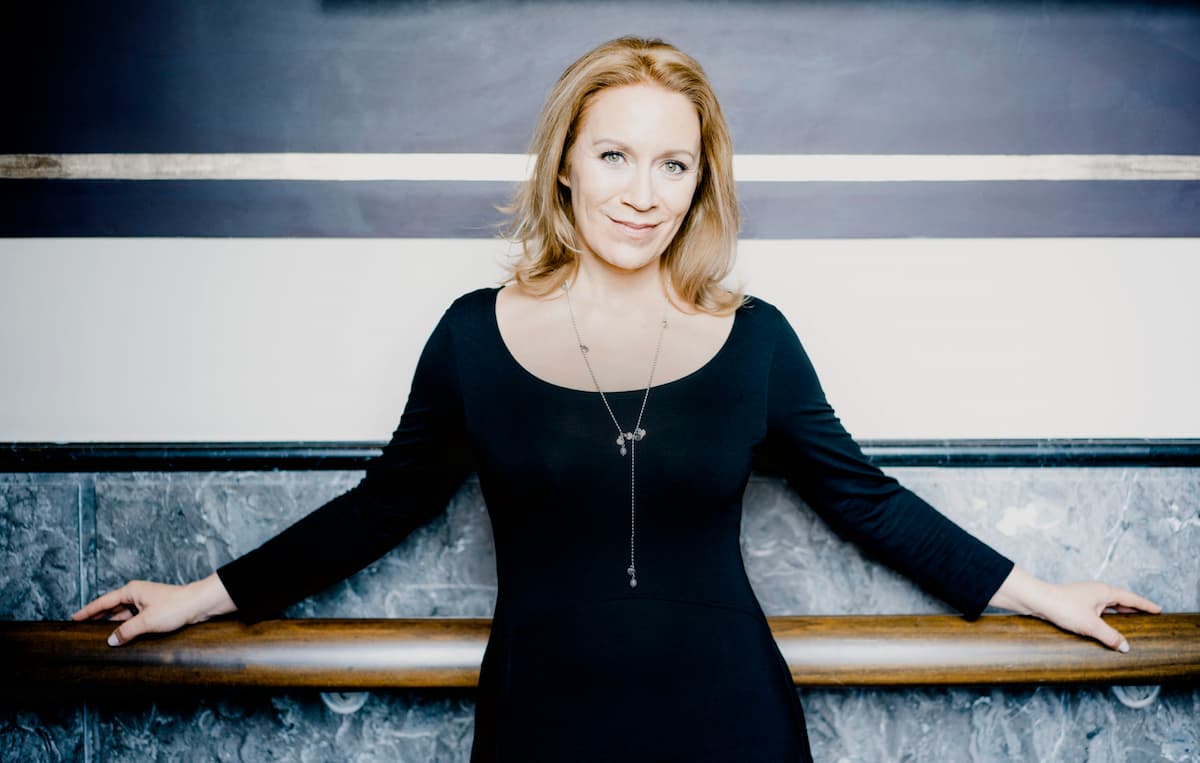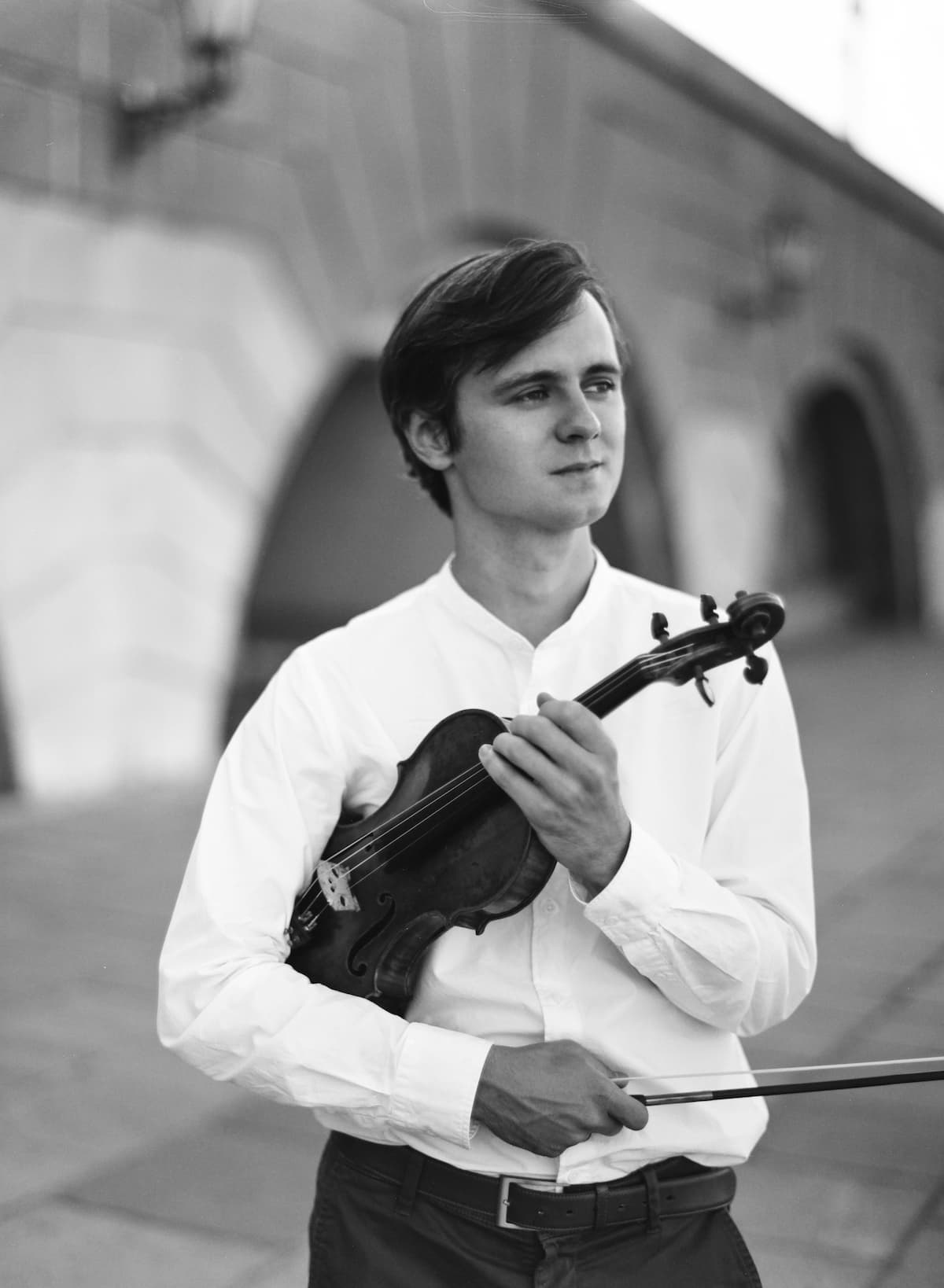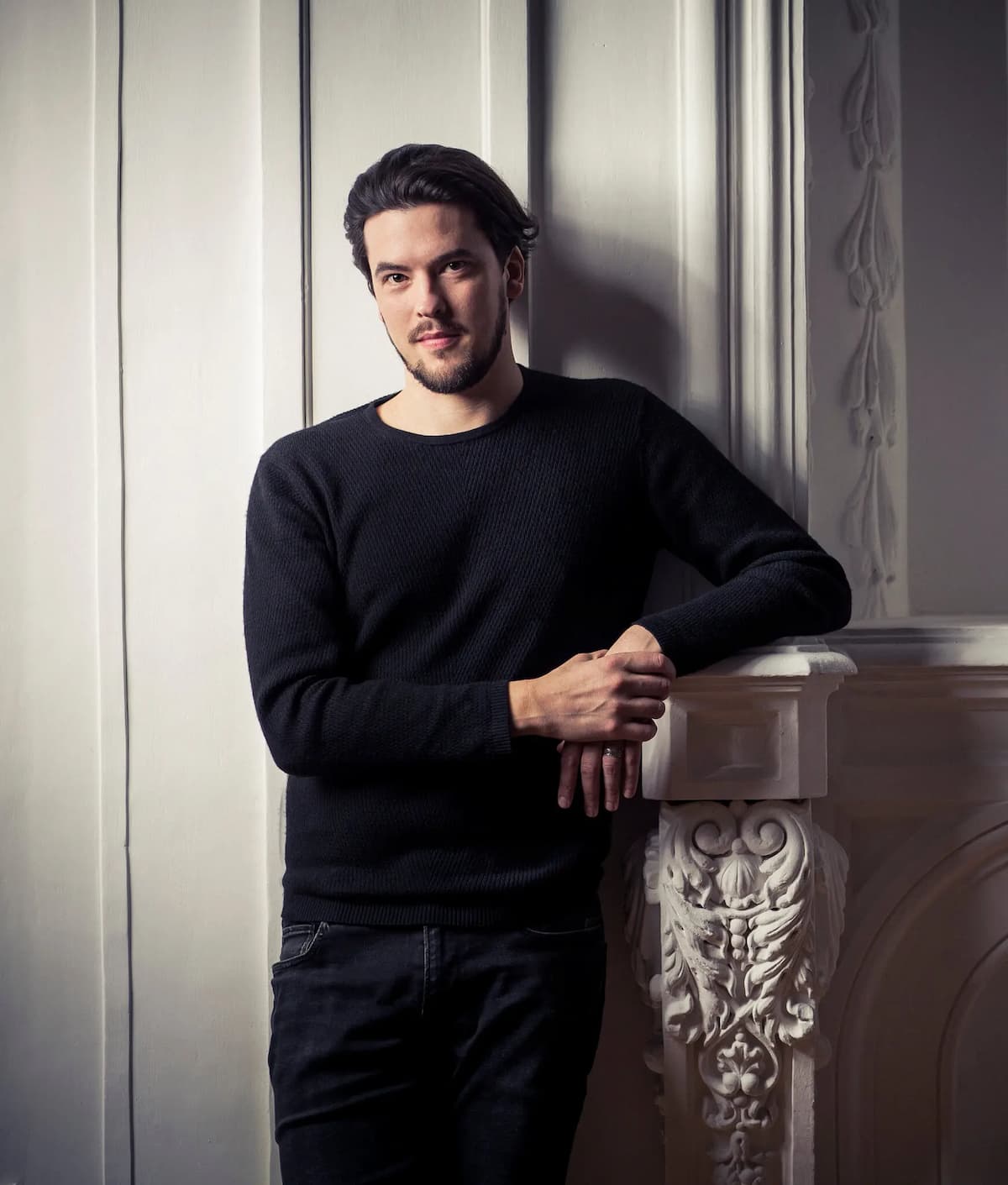‘Music is… a Source of Good for the World’
Young Italian pianist Filippo Gorini has already performed in some of the world’s most prestigious venues, including the Berlin Konzerthaus, Hamburg Elbphilharmonie, Amsterdam Concertgebouw, and Wigmore Hall in London. Filippo rose to prominence in 2015 after winning first prize at the Telekom-Beethoven competition, and in 2020 was awarded the prestigious Borletti-Buitoni Trust Award. Next season sees him give debut appearances at, among others, New York’s Carnegie Hall and the Teatro alla Scala in Milan.
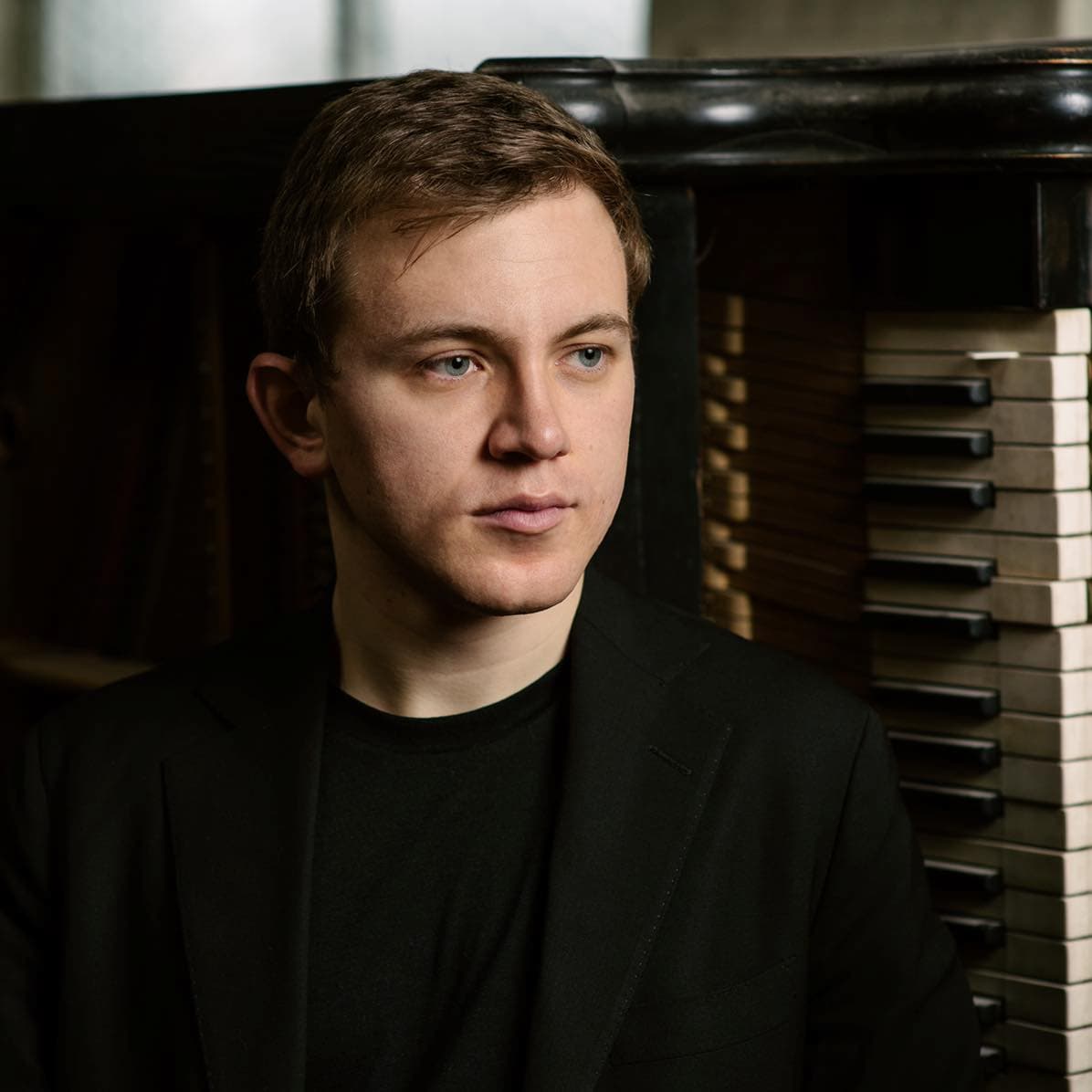
Filippo Gorini © Simon Pauly
Filippo is a musician determined to do things differently: a deep dive into Bach’s The Art of Fugue during the pandemic inspired a project featuring filmed interviews with leading figures in fields from architecture (Frank Gehry) to mathematics (Marcus du Sautoy), due for release later this year, and his desire to reimagine the idea of a touring musician led to Sonata for 7 Cities, a year packed with seven month-long residencies in cities from Cape Town to Vienna, commencing in 2025.
How did you find your way to music as a child? Was your family musical?
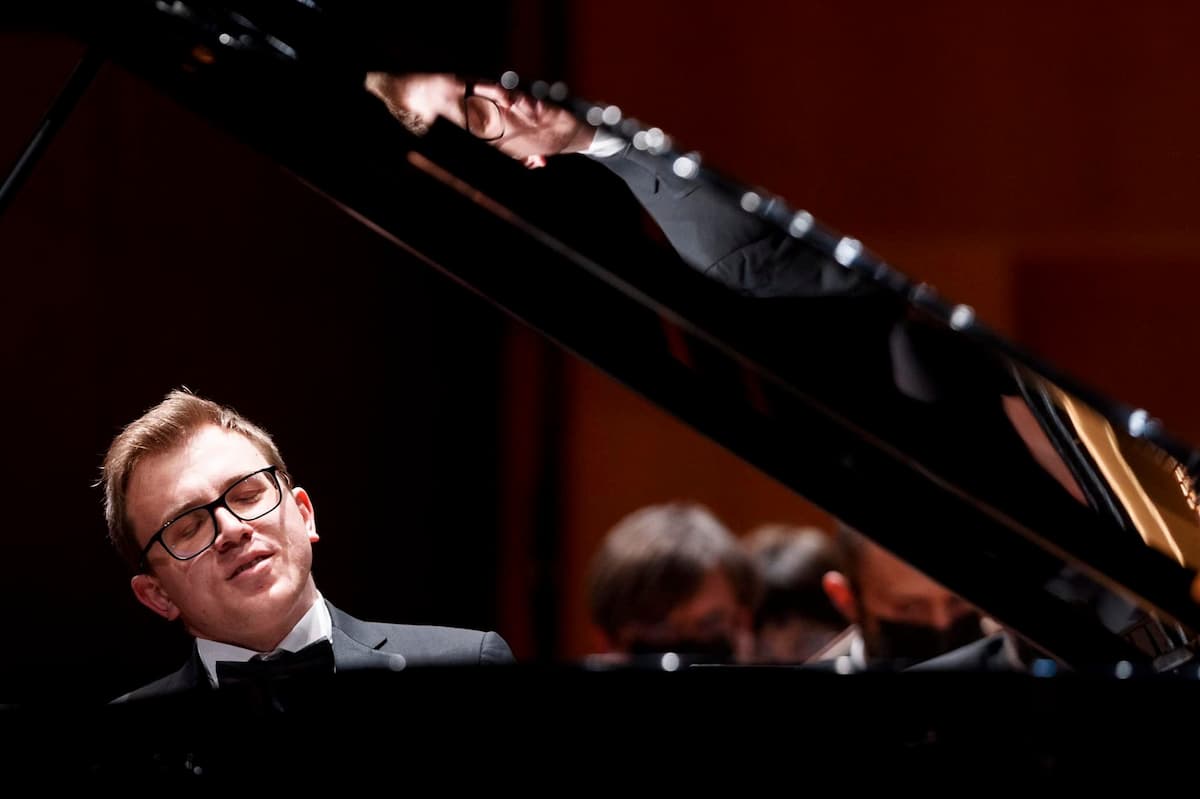
© Accademia di Santa Cecilia / ph. Musaccio, Ianniello e Pasqualini
Both my parents are actually nuclear physicists. But my father did study piano in his youth, to quite a high level, and he stopped once he was admitted to university. But when we were kids we had a piano at home – we had a certain habit of listening to music at home or on drives, and sometimes my father would play for me and my older brother, at the piano, pieces he remembered from when he still played more actively.
I think once I started being a little bit older and having a little bit more awareness of who I am, what do I want to do, which was maybe at 11 or 12 years old, that’s the time where I fell completely in love with the sonatas of Beethoven and the piano music of Schubert, which by coincidence I had the opportunity to listen to in concerts, and on CDs.
I don’t know exactly what completely attracted me to this music, but suddenly I had to buy all the scores and read all these pieces at the piano.
I had no means to actually play these works at the time, but I bought the scores and decided that I needed to become a better musician. That’s when I started practising a lot more. I found a better teacher who is still my main mentor to this day, and the person I look up the most to in terms of my musical life: Maria Grazia Bellocchio.
I would say the turning point was the year 2015, for me, when I participated in the Telekom-Beethoven Competition and received the first and audience prizes. Shortly afterwards, by coincidence, I started working with Alfred Brendel, who has been my mentor since, and I also had the opportunity to record Beethoven’s Diabelli Variations, as well as starting to perform more extensively, especially in Europe.
From there I would say I’ve just been trying to improve my playing and offer beautiful programmes as much as I can. Every year I build up on the successes (and failures!) of the year before. But I’m happy with how things are going.
Ludwig van Beethoven: 33 Variations on a Waltz by Diabelli in C Major, Op. 120, “Diabelli Variations” (Filippo Gorini, piano)
Tell us more about your initial infatuation with Beethoven and Schubert.
I think that was the first moment where I felt that there was something so deep in music: that there was a possibility of something so profound, that it was worth dedicating my time and possibly my life to. There was this sort of intuition, and I couldn’t, at that time, verbalise it as clearly as I can now, but to start practising five, six hours a day: that’s what I felt.
Do you still feel that connection to them today?
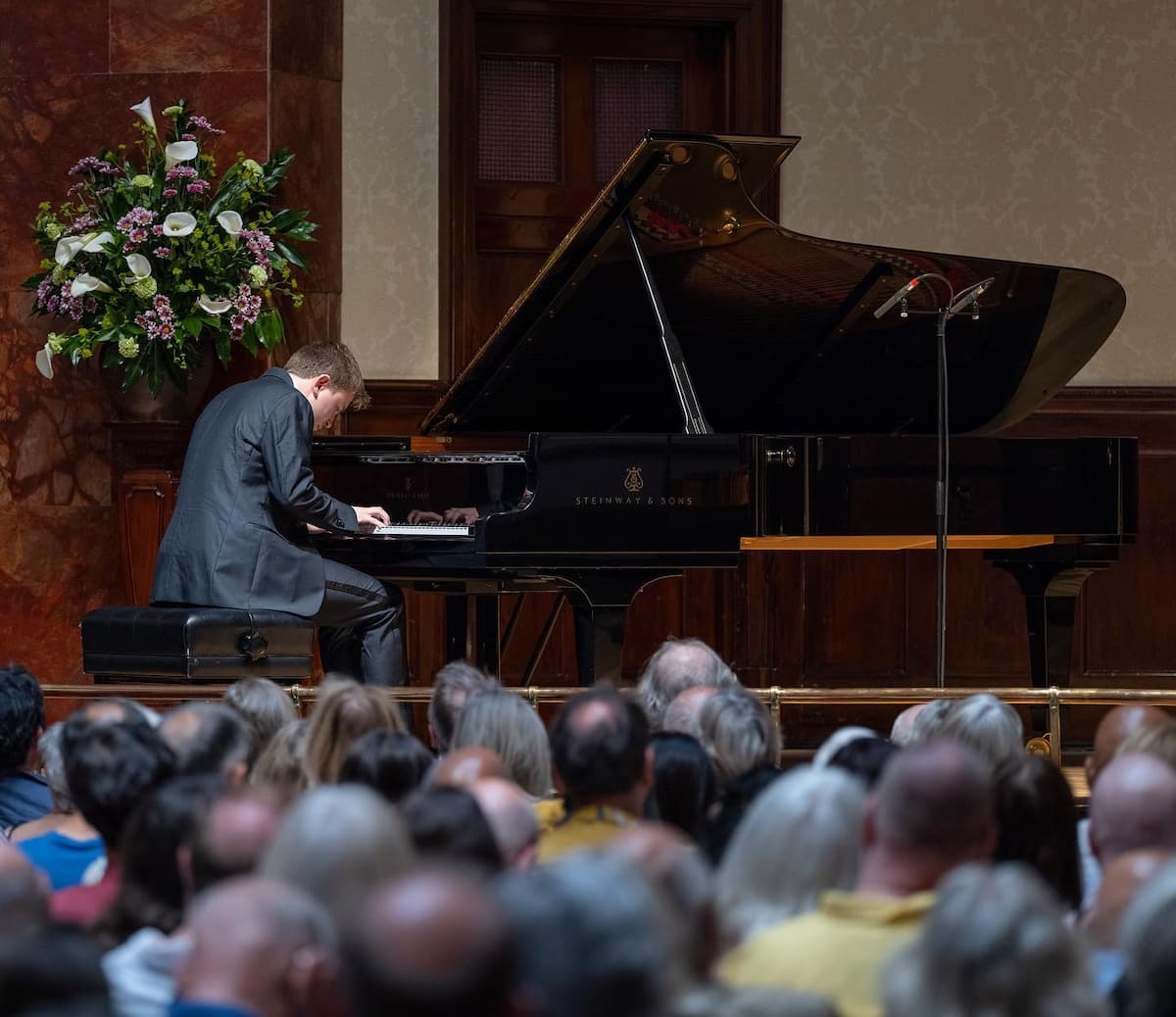
© Simon Weir / BBT
Absolutely. Two of my recordings are dedicated to Beethoven, and unless I am playing The Art of Fugue which is an only-Bach programme, every other concert I play either has one work by Beethoven or by Schubert.
I was thinking about how they’re so very different, in terms of temperament and character, but Schubert of course had vast admiration for Beethoven, and Beethoven approved of Schubert for the little that he had a chance to listen to his music.
You see that most pianists who play Beethoven well play Schubert well, and vice versa. You would struggle to find a very good Beethoven interpreter who doesn’t also play Schubert very well, even though they are so different.
But it’s very hard to pinpoint where the common thread is, because if you look at the harmonic language or the form or the kind of writing for instruments, or anything, it’s hard to find real similarities that are not very simple, that you could find with any two composers. So it’s more of a perception. But I’ve spoken to other musicians and we seem to share this perception.
Franz Schubert – Sonata in G Major D894 – Filippo Gorini, piano
Tell us about your project inspired by The Art of Fugue.
So the Art of Fugue is a masterpiece, and also an incredibly challenging work for musicians who decide to play it – also, in many ways, for the audience to listen to!
I first met it in my conservatory years, and my first impressions upon playing one or two of the fugues was that yes, there was mathematics and abstraction and all the complexity, but the amount of human expression, the beauty and the amount of emotion you can get from playing and listening to this music is actually incredibly intense, probably more than any other Bach work I had played.
I had this perception that the myth of work written only for mathematical reasons, or for speculation, or to intrigue an elite world of musicians, was a false image that did not help normal music listeners to enjoy this work, which is so incredible.
So I knew already then that I would have to learn the whole piece and play it for people during my life as a musician. And slowly, after the Beethoven Competition and throughout my first years of concerts, I learned some of the other counterpoints and even played them as encores here or there in concerts.
And then suddenly the pandemic hit, and I had no concerts, no deadlines, no firm engagements. Somehow I knew that this was the time to reach some firm point in my work on this piece. So I dedicated those months to, let’s say, finish learning it – if one is ever ‘finished’ with learning such a piece.
One thing I also wanted to do was try to go against this image of an inaccessible, intellectual work. And one way I thought of doing it was to collect a series of conversations, one for each of the fugues in the piece; conversations with not only musicians, but a painter, an architect, a mathematician, a writer, a director, a choreographer, and so on, to try and pinpoint with each of them the many sides of Bach’s music that often are not so immediately emphasised when we talk about this composer, so the emotionality, the narrative content, the physical side – the dance music, for example, in Bach’s works.
I wanted really just to try and see how fourteen great people of today view and listen to this music, what perspectives they can offer, and how they would try to help a listener enter the cosmos of this incredible musician and composer.
J.S. Bach: Contrapunctus 11 a 4 from “The Art of Fugue” BWV 1080 – Filippo Gorini
Was there a common thread that kept recurring across all your conversations?
All the interviews were very different from each other, and I wanted them to be, so we didn’t repeat the same things. If there is one perspective that we all shared, I think, it’s the fact that Bach is not music for only the intellectuals or the elite: it’s music written from the soul, to bring peace, beauty, and to move other people, and the tools that he uses to achieve this are very elevated, very high in craftsmanship, in the counterpoint, in the harmonic language that he invents as he writes more and more complex forms.
But the content is what matters the most, and in the case of The Art of Fugue, this work ultimately is like a very long journey, from birth to the mystery of where existence ceases to be. That is where Bach left the work unfinished, as he himself passed away, and I think this is the perspective that was shared by everyone.
Writing in counterpoint is the greatest challenge for a composer, even to this day. In imposing stricter and stricter limitations on oneself, such as writing a whole cycle of fugues on one subject, what happens is either the composer succumbs to the demands of the counterpoint and writes a mere exercise, or, the composer really dominates counterpoint and finds even more intense and expressive content because of the limitations imposed upon themselves.
And I think this is what happens with Bach: that the limitations, the challenges, pushed him to invent new harmonic languages and new forms of expression that in turn make the content of this work at times so intense and dramatic, especially in the longer triple fugues and in the final unfinished fugue.
What inspired the Sonata for 7 Cities project to come about?
After almost eight years of travelling a lot and playing concerts all over the world, I constantly have this sensation that landing in a city, playing your concert, getting applause, and leaving the next day is a wasted opportunity, both for me to receive more from the cities I visit, to meet more people, meet a new culture, work together with people who live there, and expand my own knowledge and view of the world.
It’s also a wasted opportunity of me giving much more than just one concert to the city and its people, its community. I had this sensation as soon as I started playing concerts.
So I decided to take it seriously and ask myself: what would happen if I imposed on myself to stay for a month in a city and just offer all I can to that community as a musician for that time frame. And that’s how this brought me to think, ‘What can I offer?’
Of course the core of my life is to perform music, the music I love, for people, so the centre of each residency will be two concerts: a recital, and a concerto with orchestra. But I also believe very strongly that music is meant to be a source of good for the world. Not just beauty: beauty and good coming together.
I don’t want this project to appear as something that’s against tours, because I enjoy playing in many cities, but I think there are other dimensions that one can devote time to at the same time. And after this project my intention, every year, is to choose one or two cities in which to have a residency and to repeat this experience, while for the rest of the time I will continue a more traditional career path.
I believe very much in playing for all sorts of people, especially those who for various reasons do not normally come to a concert hall. That could be young people, children or students, who have not had a chance to meet classical music or who do not know much about it, and unless someone grabs their interest, their attention, they might never just decide to go and see what a classical music concert is about.
I would like to go into schools and universities and perform concerts where I also engage with students and talk to them about the music that I play. In many cases they will probably never have heard a Schubert or Beethoven sonata before, and letting them know why someone who’s still just a couple of years older than them has decided to dedicate their life to these works, can be, I think, a much more motivating invitation to go to further concerts in their lives.
I think there are a lot of people who need this music more than anyone else and do not have many occasions to receive concerts, so I would like to offer concerts to hospitals, or nursing homes, or prisons. So in every city I will structure my time, I will divide it between these sorts of more philanthropic concerts, the more traditional engagements with the symphony orchestra and recital, and then also choose four or five younger pianists and mentor them for that month and offer any advice I can in that time.
I’m quite sure that from these experiences I will be getting as much, if not more, back from the intensity and the beauty of the experience and the communication with all the people I will meet and play for. So I cannot wait for this project to start.
What do you do in your spare time?
I do lots of different things that everyone enjoys doing, from hiking in mountains or swimming, to watching films and going to concerts and the theatre, or, if I’m at home, just meeting my friends and going out for a beer.
I just had a chance to have a meeting with high school students in Arezzo, where I did a concert recently, and when I was talking with them, one of the things I highlighted is in today’s world there is an extremely strong imbalance between the amount and availability of ‘light’ entertainment, and how hard it is to find time and willpower to dedicate to deeper experiences of beauty, or all sorts of things that require some work but offer a lot more in the long term.
I don’t think there’s anything wrong with watching an action movie or having a drink with friends, but I do try to invite people to look for a healthier and more enriching balance between whatever is lighter, easier and more entertaining, and what requires work but improves us and our lives, and ultimately gives meaning to life.
I would put classical music concerts as one of the experiences more on this side, the same way as reading an important and maybe long novel, or watching a substantial movie, or taking the trouble to go to the gym and exercise despite the fact it takes effort; they’re all things that improve one’s life much more.
For more of the best in classical music, sign up for our E-Newsletter

